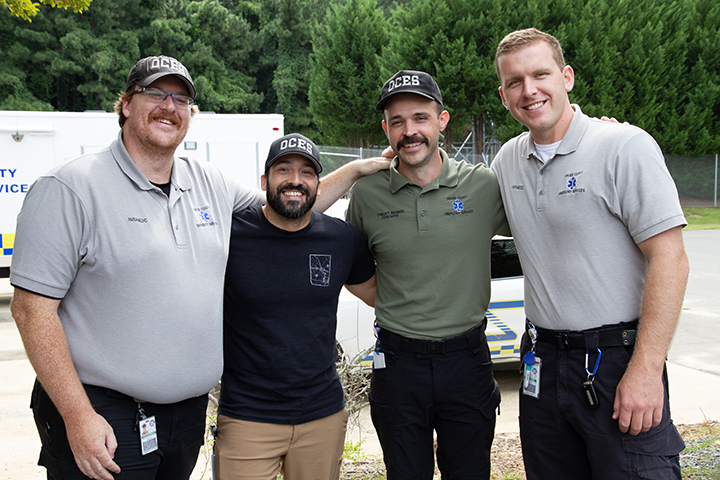Orange County recently created a Post-Overdose Response Team to help community members struggling with Opioid Use Disorder. Free of charge, the PORT’s services include starting medication-assisted treatment for opioid and substance use, while also connecting individuals to ongoing treatment.
Before the PORT began operations on July 1, Orange County’s emergency medical services could only offer two options after responding to an opioid overdose: either transport that person to a treatment facility or a refusal of transport, with that person remaining at home.
This meant a significant gap in services for those struggling with Opioid Use Disorder and Substance Use Disorder in Orange County, according to the Bureau Chief of Community Health and Safety Landon Weaver.
And for those wanting treatment before experiencing a potential overdose, Weaver said determining what treatment options exist can be both time consuming and challenging. Especially for those in a moment of crisis, the difficulty of that can be insurmountable, he added.
“Usually it’s not a matter of ‘oh, I’m interested in this, here’s the place, I’ll go there today, and they’ll put me through this intake process and I can start treatment,’ the bureau chief explained. “The bridge is to serve in that space, and that is where the gap is.”
Weaver said Orange County started exploring the concept of having a PORT in 2019. He explained Orange County’s opioid crisis was not as extensive as other North Carolina counties at the time, but the idea was to not wait until it grows to create a plan.
An extension of the county’s harm reduction resources, the specialized three-person team responds to opioid overdoses immediately or within 24-72 hours of an overdose event and also works to connect those at risk of or experiencing OUD to other resources and services.
The PORT crew can initiate, administer, and maintain medications for OUD, connect and transport an individual to ongoing treatment, and offer a caring person to talk to through its peer support specialist, Sebastian Zarasua. The team also consists of two community paramedics, William Vanderburg and Chase Jarvis.
The services are confidential, free, and offered in your home or your place of choosing.
“So what that can look like in real time is if someone calls EMS, or a referral takes place for our team or someone that’s in withdrawal, or who is just interested in receiving treatment or pursuing that direction, then our team will go out, communicate with them, engage with them, determine what their needs, their desires are, and cater a plan for that specific person,” Weaver explained.
And the team’s services are never coercive, Weaver added, stating layering on what they think is best for someone is the opposite of what the PORT seeks to accomplish.
The team can provide medication on a daily basis for up to seven days for those interested and eligible, the bureau chief said. After that, the team takes on the responsibility of finding the best treatment location for that person and ensuring they have access to it for an extended period of time.
“If this is something you want today and you need today, then we are capable of inserting our program into that gap to make it so that the next step that’s typically time consuming and very difficult to navigate is not as pressing. It’s not as immediate,” Weaver said. “Therefore in that period of time, that individual is not experiencing this desire to go back and pursue these more unsafe means of getting to that baseline level of just living.”
Since going live over the summer, the team has provided medications for 13 people, 10 of which were connected to ongoing treatment, which Weaver described as an “absolute success.” But while it is easy to get caught up in wanting to see a certain degree of deduction in repeat overdoses in Orange County, he said the team sees success as something other than a numbers game.
Instead, the bureau chief defines it as whether these services were offered to everyone who could potentially benefit and if the team attempted to make contact with them as much as possible. Success also means whether the PORT provided direct treatment for those interested and if they helped put individuals on a path towards recovery, he added.
“And then we have a process with the team where at a set frequency that gets larger and larger overtime, we continue to reach out to them and make sure they don’t have any other pertinent needs, make sure that they’re still engaged with treatment if that’s what they wish to be,” Weaver added.
If someone thinks they could benefit from PORT in any way, Weaver encouraged them to learn more.
“The team is here to help someone with wherever they’re at, whatever question they have,” Weaver said. “Even if someone denies our service and they called back two weeks later, it’s like [the refusal] never happened. This team is built solely to support the community and that’s who we’re here to serve and that’s what we’re going to continue to do.”
The PORT team is online every day of the year from 7 a.m. to 7 p.m. For more information, click here.
To request any of these services, click here.
Featured photo via Orange County.
Chapelboro.com does not charge subscription fees, and you can directly support our efforts in local journalism here. Want more of what you see on Chapelboro? Let us bring free local news and community information to you by signing up for our newsletter.


